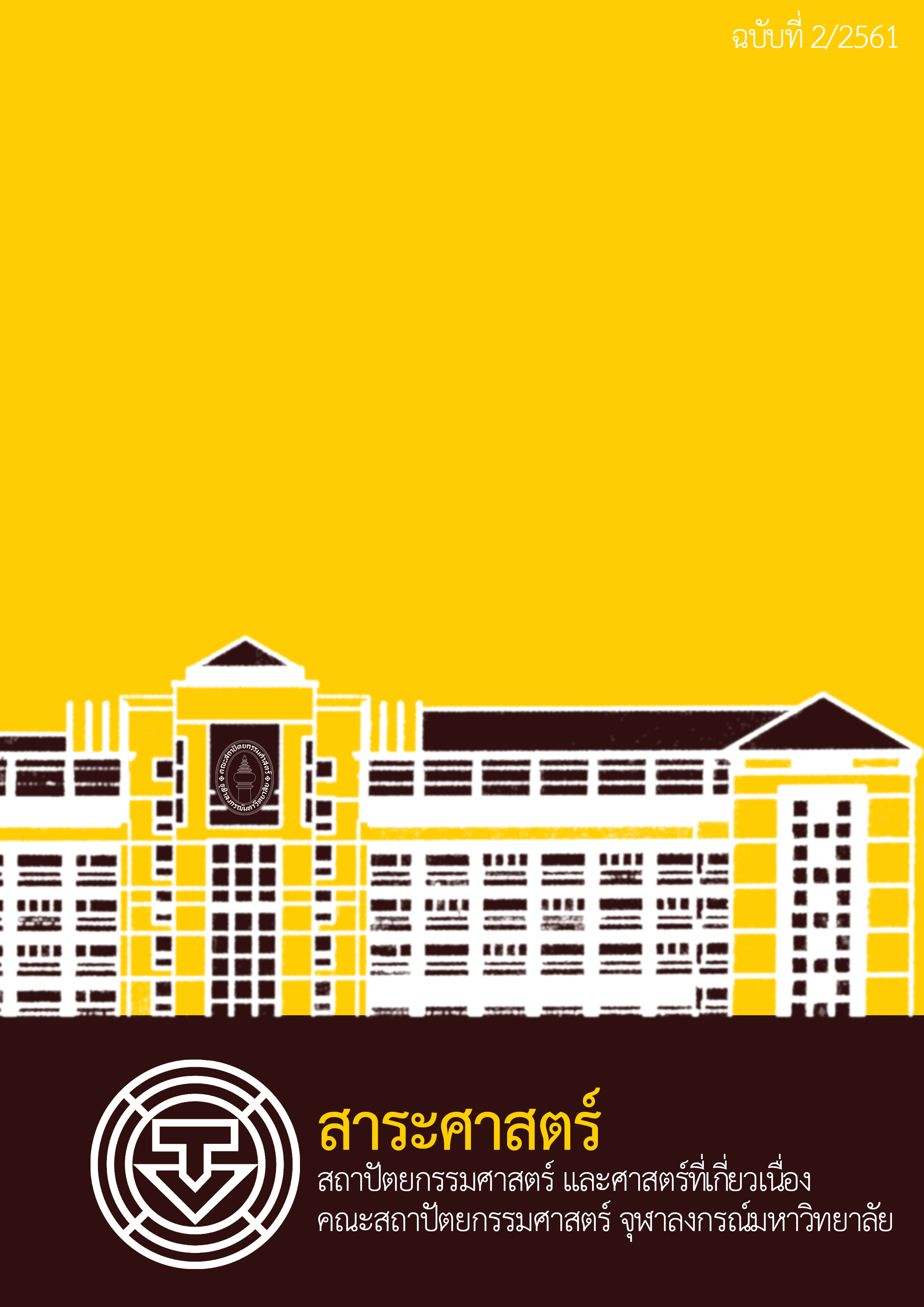การบริหารจัดการที่พักนักท่องเที่ยวแบบโฮมสเตย์โดยวิสาหกิจชุมชนบางน้ำผึ้ง
Main Article Content
บทคัดย่อ
ในปัจจุบันวิสาหกิจชุมชนที.ประกอบการที.พักโฮมสเตย์ได้มีการเพิ.มจำนวนขึvนตามกระแสการท่องเที่ยวในแบบ
ยังยืน แต่วิสาหกิจชุมชนที่ประกอบการที่พักโฮมสเตย์มีจำนวนน้อยที่ได้รับ“มาตราฐานโฮมสเตย์ไทย” และรางวลั ”วิสาหกิจ
ชุมชนดีเด่น” เมื่อเทียบกับจำนวนโฮมสเตย์ทั้งหมด งานวิจัยนี้มีจุดประสงค์เพื่อทำการศึกษา ลักษณะทางกายภาพ แนวคิด
การบริหารจัดการของวิสาหกิจชุมชนบางน้ำผึ้งโฮมสเตย์ โดยรวบรวมข้อมูลจากการสำรวจพื้นที่และสัมภาษณ์ประธาน
โฮมสเตย์ สมาชิกเจ้าของบ้านพักโฮมสเตย์ทั้ง 11 หลัง
ผลการศึกษาพบว่า 1.)รูปแบบบ้านพักส่วนใหญ่เป็นแบบพื้นถิ่นริมน้าภาคกลาง บ้านยกใต้ถุนสูง 2 ชั้น ชั้นบน
เป็นที่หลับนอน ชั้นล่างไว้สำหรับสันทนาการและเก็บอุปกรณ์ มีขนาดพื้นที่ใช้สอยตั้งแต่ 300-61 ตร.ม แต่ถ้าตั้งอยู่ริมน้ำ
เป็นบ้านไม้ชั้นเดียวมีขนาดพื้นที่ใช้สอยตั้งแต่ 139-90 ตร.ม ส่วนเรื่องการจัดบ้านพักโฮมสเตย์ ส่วนใหญ่เจ้าของบ้านพักใช้
การจัดการพื้นที่เดิมแทนการปรับปรุงบ้านพักเพื่อรองรับนักท่องเที่ยวโดยมีแบ่งออกเป็น 3 รูปแบบ คือ 1.ใช้ห้องนอนเดิมซึ่ง
เป็นรูปแบบที่มากที่สุด 2.รองลงมาใช้ห้องโถงภายในบ้าน และ 3.ใช้ทั้งห้องนอนและห้องโถงภายในบ้าน 2.)การบริหาร
จัดการแบ่งออกได้เป็น 3 ด้านคือ 1.ด้านบ้านพัก เจ้าของบ้านกำหนดพืvนที. ทำความสะอาดบ้านพักและทำการต้อนรับ
นักท่องเที่ยวรวมกันที่ส่วนกลางในวันแรกที.เข้าพัก 2.ด้านองค์กรและบริการ โฮมสเตย์จะมีการประชุมร่วมกัน ออกกฎ
นโยบาย และประชุมหลังจากให้บริการนักท่องเที.ยวในแต่ละครั้ง มีการจัดสรรบ้านพักอย่างหมุนเวียน มีการร่วมกัน
ทำอาหารให้แก่นักท่องเท.ียวและรับซือv วัตถุดิบจากในชุมชน และร่วมมือกับองค์การบริหารส่วนตำบลในการช่วยจัดเวรยาม
และจัดทำสื่อแผ่นพับ โฮมสเตย์จะแบ่งรายได้ที่ได้รับจากนักท่องเที่ยวเพื่อสนับสนุนการทำงาน การประชาสัมพันธ์เน้นการ
บอกต่อจากนักท่องเที่ยว 3.ด้านทรัพยากรการท่องเที่ยว สร้างกิจกรรมจากทรัพยากรท้องถิ่นและภูมิปัญญาของชุมชน เช่น
บ้านลูกประคบสมุนไพรธัญพืช การปันจักรยานและพายเรือชมธรรมชาติ โดยทำในรูปแบบเครือข่ายการท่องเที่ยว
ผลการศึกษาชี้ให้เห็นว่า วิสาหกิจชุมชนบางน้ำผึ้ง โฮมสเตย์ มีหลักการบริหารโดยจัดการที่ให้ความสำคัญกับการ
มีส่วนร่วมในทุกภาคส่วน มุ่งเน้นการสร้างและกระจายรายได้ ผ่านการสร้างมูลค่าจากทรัพยากรท้องถิ่นและวิถีชีวิตภูมิ
ปัญญาพื้นบ้าน โดยแสดงออกมาในการสร้างกิจกรรม ในแหล่งท่องเที่ยวอย่างเป็นเครือข่ายเชื่อมโยงกัน นำมาสู่การมีส่วน
ร่วมของชุมชนและร่วมกันดูแลรักษาธรรมชาติซึ่งเป็นแหล่งทรัพยากรที่สำคัญ อันจะนำไปสู่การพัฒนาที่ยั่งยืนต่อไป
Article Details
เอกสารอ้างอิง
พิมพ์ลภัส พงศกรรังศิลป์. (2557). การจัดการการท่องเที่ยวชุมชนอย่างยั่งยืน: กรณีศึกษา บ้านโคกไคร จังหวัดพังงา. วารสารวิชาการ Veridian E-Journal 7(3): 650-665.
ภัทรวดี จินดารักษ์. (2559). การท่องเที่ยวชุมชนกับการมีส่วนร่วมในการอนุรักษ์สิ่งแวดล้อม พื้นที่สีเขียว ตำบลบางกะเจ้าและตำบลบางน้าผึ้ง อำเภอพระประแดง จังหวัดสมุทรปราการ. (วิทยานิพนธ์ปริญญาบัณฑิต), มหาวิทยาลัยเกษตรศาสตร, กรุงเทพฯ.
ยุทธนา สมลา. (2549). การบริหารจัดการแหล่งพักอาศัยแบบโฮมสเตย์ตามแนวทางปรัชญาเศรษฐกิจพอเพียง: กรณีศึกษาหมู่บ้านบุไทร อำเภอวังน้ำเขียว จังหวัดนครราชสีมา. (วิทยานิพนธ์ปริญญามหาบัณฑิต), จุฬาลงกรณ์มหาวิทยาลัย, กรุงเทพฯ.
เสรี พงศ์พิศ. (2548). ฐานคิด จากแผนแม่บทสู่วิสาหกิจชุมชน. กรุงเทพฯ: เจริญวิทย์การพิมพ์.
สำนักพัฒนาบริการท่องเที่ยว. (2558). มาตรฐานโฮมสเตย์ไทย. กรุงเทพฯ: โรงพิมพ์แห่งจุฬาลงกรณ์มหาวิทยาลัย.
Andrew Marshall. (2006). Best Urban Oasis. Retrieved October 23, 2017, สืบค้นเมื่อ 12 ตุลาคม 2560. จาก
https://content.time.com/time/magazine/article/0,9171,1194117,00.html
World Tourism Organization. (2003). Thailand Homestay Project Final Report UNDP/WTO PROJECT-THA/00/003 Sustainable Development of Tourism for Thailand Training course on Homestay Operation. Madrid: World Tourism Organization, (Mimeograph).


